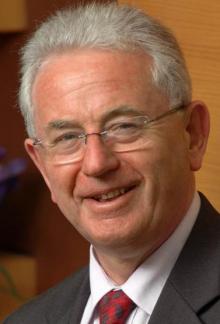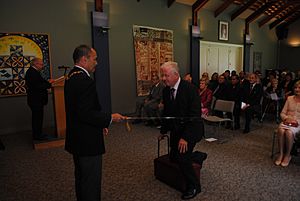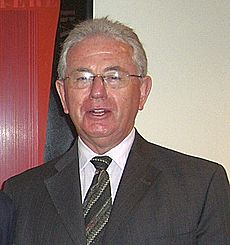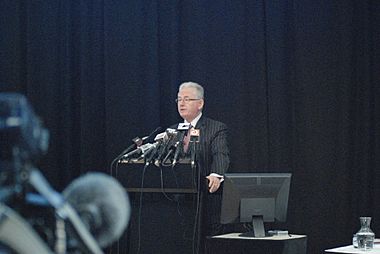Michael Cullen (politician) facts for kids
Quick facts for kids
Sir Michael Cullen
|
|
|---|---|

Official portrait of Cullen, 2008
|
|
| 16th Deputy Prime Minister of New Zealand | |
| In office 15 August 2002 – 19 November 2008 |
|
| Prime Minister | Helen Clark |
| Preceded by | Jim Anderton |
| Succeeded by | Bill English |
| 40th Minister of Finance | |
| In office 10 December 1999 – 19 November 2008 |
|
| Prime Minister | Helen Clark |
| Preceded by | Bill Birch |
| Succeeded by | Bill English |
| 26th Minister of Revenue | |
| In office 10 December 1999 – 17 October 2005 |
|
| Prime Minister | Helen Clark |
| Preceded by | Bill Birch |
| Succeeded by | Peter Dunne |
| 4th Treasurer of New Zealand | |
| In office 10 December 1999 – 15 August 2002 |
|
| Prime Minister | Helen Clark |
| Preceded by | Bill English |
| Succeeded by | Position Abolished |
| 13th Deputy Leader of the Labour Party | |
| In office 11 June 1996 – 11 November 2008 |
|
| Leader | Helen Clark |
| Preceded by | David Caygill |
| Succeeded by | Annette King |
| 18th Minister for Social Welfare | |
| In office 24 August 1987 – 2 November 1990 |
|
| Prime Minister | David Lange Geoffrey Palmer Mike Moore |
| Preceded by | Ann Hercus |
| Succeeded by | Jenny Shipley |
| Member of the New Zealand Parliament for Labour party list |
|
| In office 27 November 1999 – 30 April 2009 |
|
| Succeeded by | Damien O'Connor |
| Member of the New Zealand Parliament for St Kilda Dunedin South (1996–1999) |
|
| In office 28 November 1981 – 27 November 1999 |
|
| Preceded by | Bill Fraser |
| Succeeded by | David Benson-Pope |
| Personal details | |
| Born | 5 February 1945 London, England |
| Died | 19 August 2021 (aged 76) Whakatāne, New Zealand |
| Political party | Labour |
| Spouses |
Rowena Joy Knight
(m. 1967; div. 1989)Anne Collins
(m. 1989) |
| Profession | Historian |
| Alma mater | University of Canterbury (BA & MA) University of Edinburgh (PhD) |
| Scientific career | |
| Institutions | University of Otago |
| Thesis | Social statistics in Britain 1830–852 (1971) |
Sir Michael John Cullen (5 February 1945 – 19 August 2021) was an important New Zealand politician. He held many big jobs, including Deputy Prime Minister, Minister of Finance, and Attorney-General. He was also the deputy leader of the Labour Party for a long time, from 1996 to 2008. He stopped being a Member of Parliament in 2009. Later, he became the chairman of New Zealand Post. In 2020, he shared that he had been diagnosed with a serious illness, small-cell lung cancer.
Contents
Early Life and Education
Michael Cullen was born in London, England, on 5 February 1945. His father made glasses, and his mother was a secretary.
When he was 10 years old, in 1955, his family moved from England to New Zealand. He went to Christ's College in Christchurch on a scholarship. After school, he studied history at the University of Canterbury, where he earned two degrees.
He then received a special scholarship to study at the University of Edinburgh in Scotland, where he earned his PhD. He was the first person in his family to go to university! From 1971 to 1981, he taught at the University of Otago in New Zealand. Michael Cullen became a New Zealand citizen in 1975.
Member of Parliament
| New Zealand Parliament | ||||
| Years | Term | Electorate | List | Party |
| 1981–1984 | 40th | St Kilda | Labour | |
| 1984–1987 | 41st | St Kilda | Labour | |
| 1987–1990 | 42nd | St Kilda | Labour | |
| 1990–1993 | 43rd | St Kilda | Labour | |
| 1993–1996 | 44th | St Kilda | Labour | |
| 1996–1999 | 45th | Dunedin South | 2 | Labour |
| 1999–2002 | 46th | List | 2 | Labour |
| 2002–2005 | 47th | List | 2 | Labour |
| 2005–2008 | 48th | List | 2 | Labour |
| 2008–2009 | 49th | List | 2 | Labour |
Michael Cullen joined the Labour Party in 1974. In 1981, he was elected as a Member of Parliament (MP) for the Dunedin area called St Kilda. An MP is someone elected by people to represent them in the country's Parliament.
Fourth Labour Government
In 1984, the Labour Party formed the government, and Michael Cullen became a Senior Whip. This role helps make sure all party members vote together. He became involved in discussions about the country's money matters. He was made an Associate Minister of Finance and Minister of Social Welfare. This meant he helped manage the country's money and social support systems.
He worked to improve how welfare was given out, especially for Māori people. He also helped pass a new law called the Children, Young Persons, and Their Families Act. This law was important for protecting children and young people. During this time, he faced some personal challenges, but he chose to continue his work in government.
In 1989, he married another Labour MP, Anne Collins.
In Opposition
When the Labour Party lost the election in 1990, they became the "opposition." This means they were not in charge of the government, but they still worked in Parliament to question the government and offer different ideas. Michael Cullen became Labour's spokesperson for social welfare. Later, he became the Shadow Minister of Finance, meaning he was the main person for finance in the opposition.
In 1996, he became the Deputy Leader of the Labour Party. He often said he was happy being the "number two" person, meaning he preferred to support the leader rather than be the main leader himself.
Fifth Labour Government
Before the 1999 election, Michael Cullen moved to Napier. He then became a "List MP," which means he was elected based on his party's overall votes, not just from one local area. When Labour won the election in 1999, he became the Minister of Finance.
As Minister of Finance, he managed the country's money very well. He delivered nine budget surpluses in a row. A budget surplus means the government collected more money than it spent. This was the longest time any finance minister had done this since the 1940s. This helped New Zealand be in a good financial position later on.
After the 2002 election, Michael Cullen also became the Deputy Prime Minister. This is the second-highest job in the government.
He was known as one of the Labour Party's best speakers in Parliament. He was also known for his sharp and sometimes funny sense of humour.
Budget 2006
In 2006, Michael Cullen presented his seventh budget. He believed it was important to save money when the economy was doing well. He said, "The fool who spends on the upturn will find himself broke on the downturn." This means it's wise to save for harder times.
Budget 2007
In 2007, Labour's eighth budget made some changes to taxes. It lowered the tax rate for companies from 33% to 30%. It also introduced a special tax credit to encourage businesses to do more research and development. This budget also changed some things about the KiwiSaver scheme, which helps people save for retirement.
Budget 2008
The New Zealand economy started to slow down in late 2007. Michael Cullen's last budget was in May 2008. It lowered income tax for people earning less money and also reduced the company tax rate a little more.
Resignation and Retirement from Politics
After the Labour Party lost the election in 2008, Michael Cullen announced he would step down as deputy leader. He also resigned from Parliament in April 2009. After leaving politics, he took on several important public roles.
Political Views
Michael Cullen believed in social democracy. This is a political idea that supports a fair society where the government helps people and provides good public services.
He supported civil unions in New Zealand, which allowed same-sex couples to have legal partnerships. In 2020, he also supported the End of Life Choice Bill.
Even though he was against a capital gains tax when he was Minister of Finance, he later changed his mind. As the head of a special group looking at taxes, he suggested that New Zealand should have a capital gains tax. He believed it was needed to help make society more equal.
Post Politics
After leaving Parliament, Michael Cullen continued to work in public service. He was part of a group that advised on the country's constitution. He also chaired the boards of New Zealand Post and the Earthquake Commission. He was appointed to lead the Bay of Plenty District Health Board in 2019.
In March 2020, he stepped down from most of his public roles because he was diagnosed with stage IV small-cell lung cancer. His book about his time in politics, Labour Saving, was published in June 2021. He passed away from his illness on 19 August 2021, at the age of 76.
Honours and Awards

In 1990, Michael Cullen received the New Zealand 1990 Commemoration Medal. In 2009, the University of Otago gave him an honorary law degree. This was to recognise his work as a university teacher and his important role as a politician.
In 2012, he was made a Knight Companion of the New Zealand Order of Merit. This meant he could use the title "Sir" before his name, recognising his great service to New Zealand.
 | Janet Taylor Pickett |
 | Synthia Saint James |
 | Howardena Pindell |
 | Faith Ringgold |



